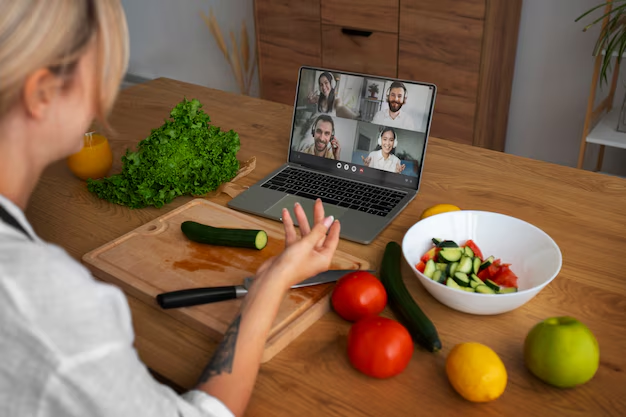Nutrition Tips for Remote Workers Remote work has transformed how we approach our daily routines, especially around meals and snacks. With easy access to the kitchen, fluctuating schedules, and the temptation of quick snacks, maintaining healthy eating habits while working from home can be challenging. Yet, prioritizing nutrition is essential for staying productive, focused, and energized throughout the day. In this blog, we’ll explore practical nutrition tips specifically designed for remote workers to help build healthy, sustainable eating habits.
Why Nutrition Matters for Remote Workers
- Impact on Productivity and Focus:
- What we eat has a direct impact on our brain function, energy levels, and ability to focus. Nutrient-dense foods fuel the body and keep blood sugar stable, preventing the energy crashes that can disrupt productivity.
- Poor nutrition, on the other hand, can lead to fatigue, lack of focus, and mood swings, all of which can hinder work performance.
- Supporting Long-Term Health:
- Remote work can often lead to a more sedentary lifestyle, making a balanced diet even more critical to avoid weight gain, poor digestion, and other health issues.
- Good nutrition promotes immune health, supports mental well-being, and reduces the risk of chronic diseases—important factors for maintaining overall wellness while working from home.
The Challenges of Eating Well When Working Remotely
- Easy Access to Unhealthy Snacks:
- With the kitchen only steps away, it’s easy to grab high-calorie, low-nutrient snacks out of habit or boredom.
- Irregular Eating Patterns:
- Without a structured office schedule, it’s common for remote workers to skip meals or snack continuously throughout the day, leading to overeating or unstable blood sugar.
- Mindless Eating:
- Many remote workers eat while working, which can lead to overeating, as it’s easy to lose track of portion sizes when distracted.
Understanding these challenges helps us address them more effectively and find strategies for healthier eating while working remotely.
Practical Nutrition Tips for Remote Workers
Here are some actionable tips to improve nutrition habits and stay energized and productive throughout the workday.
A. Plan Your Meals and Snacks in Advance
- Why It Helps:
- Planning meals reduces the temptation to reach for unhealthy snacks and helps keep your energy stable throughout the day.
- Knowing what and when you’re going to eat helps create structure, making it easier to maintain a balanced diet.
- How to Implement:
- Meal Prep: Prepare meals ahead of time, ideally over the weekend or at the start of the week, to avoid last-minute, less healthy choices.
- Snack Prep: Pre-portion healthy snacks like nuts, fruit, or yogurt in small containers so they’re ready to grab when you’re hungry.
B. Schedule Regular Meal Times
- Why It Helps:
- Setting consistent mealtimes prevents skipped meals and reduces mindless snacking. Regular meal times also stabilize blood sugar, reducing fatigue and improving concentration.
- How to Implement:
- Block Time on Your Calendar: Schedule specific times for breakfast, lunch, and snacks, just as you would for meetings.
- Set Alarms or Reminders: Use your phone or computer to remind yourself to take a break for meals, which can be especially helpful if you tend to get lost in work.
C. Create a Dedicated Eating Space
- Why It Helps:
- Eating away from your desk reduces the likelihood of mindless eating, allowing you to be more mindful of what you’re consuming and how much.
- How to Implement:
- Designate a Spot for Meals: Choose a specific place, like the kitchen or dining table, where you’ll eat each meal.
- Practice Mindful Eating: Focus on the meal without screens or work distractions. This allows you to enjoy your food, recognize fullness, and prevent overeating.
D. Choose Balanced, Nutrient-Dense Foods
- Why It Helps:
- Eating balanced meals with a mix of protein, fiber, and healthy fats helps keep energy levels steady throughout the day and reduces cravings for sugary snacks.
- How to Implement:
- Opt for Whole Grains: Instead of refined grains, choose whole-grain options like brown rice, whole-grain bread, or quinoa, which release energy slowly.
- Incorporate Protein and Healthy Fats: Add lean protein (like chicken, fish, or beans) and healthy fats (such as avocados, nuts, or olive oil) to each meal to keep you full longer and help prevent snacking.
- Load Up on Vegetables and Fruits: These are nutrient-dense and provide essential vitamins and fiber.
E. Keep Healthy Snacks Accessible
- Why It Helps:
- Having nutritious snacks on hand makes it easier to avoid reaching for chips, sweets, or other less healthy options.
- How to Implement:
- Healthy Snack Ideas: Try options like mixed nuts, Greek yogurt, hummus with veggies, or fruit. These provide protein, fiber, and vitamins, helping keep you energized without spiking blood sugar.
- Store Snacks Nearby: If you’re tempted by frequent trips to the kitchen, keep healthy snacks at your desk to curb cravings before reaching for less nutritious options.

Staying Hydrated
A. Keep Water Within Reach
- Why It Helps:
- Dehydration can lead to fatigue, headaches, and poor concentration. Having water on hand reminds you to drink regularly throughout the day.
- How to Implement:
- Use a Water Bottle: Keep a reusable water bottle at your desk and refill it throughout the day to encourage regular sips.
- Set Water Goals: Aim for 8 glasses a day, adjusting based on activity level and personal needs. You could even mark times on the bottle as reminders to drink.
B. Limit Caffeinated Beverages
- Why It Helps:
- While coffee or tea can provide a temporary energy boost, too much caffeine can lead to energy crashes, dehydration, and disrupted sleep if consumed late in the day.
- How to Implement:
- Switch to Herbal Teas or Infused Water: If you’re looking for variety, try herbal teas or water infused with lemon, cucumber, or mint.
- Limit to Morning Hours: Avoid caffeine in the afternoon to prevent sleep disturbances.
Combatting Stress Eating
A. Identify Triggers for Emotional Eating
- Why It Helps:
- Recognizing stress or boredom as triggers helps you make conscious choices about eating, rather than using food as a distraction.
- How to Implement:
- Pause Before Eating: Take a moment to assess whether you’re truly hungry or if you’re reaching for a snack out of stress.
- Find Alternatives to Cope with Stress: Activities like taking a short walk, practicing deep breathing, or listening to a favorite song can help relieve stress without eating.
B. Practice Portion Control
- Why It Helps:
- It’s easy to eat larger portions when working from home. Portion control can help you avoid overeating, especially with snacks.
- How to Implement:
- Use Smaller Plates or Bowls: This simple trick helps control portion sizes and can prevent mindless eating.
- Pre-portion Snacks: Measure out a single serving of snacks rather than eating directly from large containers.
Building a Sustainable Routin
A. Make a Weekly Meal Plan
- Why It Helps:
- Planning meals reduces the stress of deciding what to eat each day, making it easier to stick to a balanced diet.
- How to Implement:
- Plan Simple, Balanced Meals: Choose a few recipes each week, making sure they include protein, fiber, and healthy fats.
- Create a Shopping List: Stick to your list to avoid impulse buys of less healthy foods.
B. Celebrate Small Wins
- Why It Helps:
- Developing healthy habits takes time, and celebrating small successes helps build a positive relationship with food.
- How to Implement:
- Track Your Progress: Use a journal or app to track your meals, water intake, and energy levels. Reflecting on progress helps reinforce healthy habits.
- Reward Yourself: Treat yourself to non-food rewards, like a relaxing activity or a new book, as you hit your goals.

Conclusion
With some structure and mindful practices, remote workers can maintain a nutritious, balanced diet that supports both productivity and long-term health. Planning meals, scheduling regular meal breaks, and focusing on nutrient-dense foods are all effective ways to stay energized and focused throughout the workday. Remember, small changes can lead to lasting habits—take it step by step, and enjoy the positive impact of better nutrition on your overall well-being!

